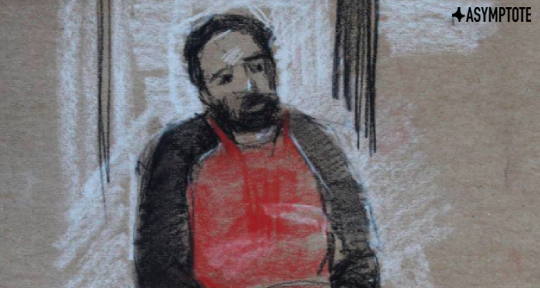Turkish dude lit is much like dude lit elsewhere: it deals with the trials of privileged man-boys. Unlike some of the genre’s more vilified geographic variants, though, it has yet to be carefully examined. While grateful for the chance to indulge in it freely, former Asymptote contributor Matthew Chovanec has his qualms; in particular, he argues, pinning Turkey’s Volksgeist on its male antiheroes actually does them (and their readers) a disservice. Enter The Mosquito Bite Author, in Chovanec’s own recent translation: might acclaimed writer Barış Bıçakçı’s subtle parody of the vain male figure pave the way to its survival?
I really enjoy Turkish novels about men wasting away in their comfortable, petty-bourgeois lives. I can’t get enough of them. I love following along, a vicarious flaneur, as the protagonists stroll through my favorite Istanbul streets. I’m charmed by their ability to take just the right line of surrealist poetry from the Ikinci Yeni movement and make it fit as an oracular judgment on their own personal haplessness. I even like reading about them sitting at home, staring at their bookshelves and resenting their wives. Something about them has me consuming these titles with the faithfulness of a reader of policiers or harlequin novels, and Turkey keeps producing them with almost pulp-like regularity. Every decade, it seems, brings its own antihero, yawning at modernist art exhibits, slinking away from military coups, scorning the superficiality that comes with economic liberalization, or trying out the latest fashions in postmodern soliloquy.
While I myself am a voracious reader of highly literate accounts of sociopathy, I appreciate that they aren’t for everyone. As an American, I can also admit that I’ve basically taken a circuitous linguistic route to enjoying works that would face derision back home, reveling as I am in another country’s “Dude Lit.” Laura Fraser describes the genre as one whose “books generally propel a confused, often drug-addled or alcoholic, narcissistic, philandering male protagonist to, well, not self-discovery, but some semblance of adult behavior.” Her description could just as easily apply to the protagonists of Turkish novels like Yusuf Atılgan’s Aylak Adam, Oğuz Atay’s Tutunamayanlar, Vedat Türkali’s Bir Gün Tek Basına, or Ayhan Gecgin’s Gençlik Düşü; they, in turn, make frequent reference to the Slacker International, inhabiting the same fictional universe as Seymour Glass or John Shade. READ MORE…



